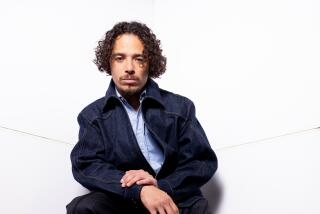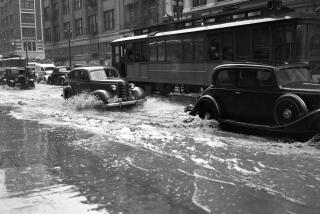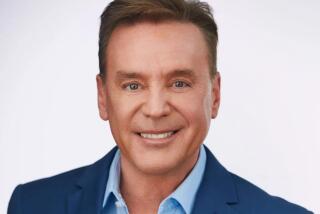In Their Elements : Weathercasters do it with Maps, Meteorology, Good Looks and Comedy
How do you like your weather?
Early in the day or late at night? Straight up, or with a splash of humor? In a three-piece suit or a dress? In front of a weather map or on a beach in Cannes? These days, you can get your weather almost any way you please. Current prevailing taste, however, seems to be a variation on âweather liteâ: good information imparted by a good-looking person in a good mood.
It wasnât always that way. In the beginning, recalls KCBSâ Maclovio Perez, âweathercasters were these retired Air Force and Army guys. Then it was bimbettes in hot pants. Then it was a minority slot, which made a visual point but wasnât too threatening to the general population; it was kind of a half-step forward. Then it was broadcast meteorologists, and when that didnât work it became comics: guys with funny bow ties.â
Today, many weathercasters are also working comedians--and KNBCâs Fritz Coleman makes no apologies for his dual status. âMy comedy background makes me a better communicator; I can think on my feet,â says Coleman, whose reports are done ad lib. âI have the latitude to be fun, and have fun with what Iâm doing. But even if I have fabulous jokes, I have to be conscious of the context Iâm in--say Iâm following a crash story--sensitive to that mood. There are nights when it would be inappropriate to be light about anything.â
âThe Today Showâsâ Willard Scott, who describes himself as a âp.r. weatherman,â got his start reading weather bulletins during the Vietnam War, and remembers the necessity for comic diversion. âPeople expected me to be silly,â says Scott, a former Ronald McDonald famous for his dress-ups and folksy birthday greetings. âIt was a black period in history. When I came on, I was a buffoon, silly--but not a smart-aleck, not disrespectful, harsh or vulgar. The worst thing I did was make an ass of myself.â
The result, of course, is that a weathercasterâs popularity ultimately comes down to personality. Viewers have to like this person.
âEveryone knows the weather I give is the same as someone elseâs,â reminds Scott. And Coleman, the subject of a long-running publicity campaign with sportscaster Fred Roggin, admits âthe way I present the news is what makes me different. You have to stand out. And it canât be a clip-on tie or a dumb smile.â
KCALâs Dianne Barone acknowledges that gender can also factor into popularity. âIâm glad to be a female in a male-dominated area,â she says bluntly, âbecause it separates me from the rest.â
Although their numbers hardly reflect it now, women do have a history in weathercasting. Local anchors Kelly Lange and Ann Martin started out doing the weather, at a time when it was perceived as a career steppingstone.
âItâs the pendulum theory,â says Barone. âWhat flies one year becomes stagnant and boring--then it swings back. At one time, the weathercaster was typically feminine, the nicest-looking woman in the newsroom--like set decoration. We called her the weather bunny. That lasted awhile. Then women began to be offended and want to prove themselves as writers, producers, reporters, anchors.â
The current crop of weathercasters--most thirty- to fortysomething--invariably is trained in communications of some kind. A few have science backgrounds; most do not. Many learned on the job.
âGood Morning Americaâsâ Spencer Christian was a general news reporter, and made his weather entry when he filled in for a local stationâs newly quit weatherman. âIt didnât take long to gain the knowledge,â he says lightly. âWeather is not the most difficult science.â
Morning-show weathercasters Christian, Scott, and CBSâ âThis Morningâsâ â Mark McEwen do not compile their own stats; each show has a meteorologist who comes in around midnight and begins assessing the data. Christian arrives at 4:50 a.m. for a 30-minute briefing, then does âWorld News This Morningâ at 5:30. McEwen, who calls himself a âweather presenter,â logs in with his meteorologist at 4:45. Virginia resident Scott eschews New York and broadcasts from NBCâs Washington news bureau.
Locally, the weathercastersâ level of scientific training differs from station to station.
KABC hails Dallas Raines as its âaward-winning meteorologist,â and the distinction does set him apart. Raines (âI have no problem admitting they hired me for my looks and personality, to be this Southern California-looking guyâ) got his bachelorâs degree in earth science at Florida State and taught a course in meteorology last semester at Cal State L.A. âItâs definitely an anomaly in Los Angeles,â he says of his science degree, âbut I think it works to my advantage.â
Barone, too, is a member of the American Meteorological Society. Locally born, she âgrew up watching Dr. George (Fischbeck)â; later, working as a page at KABC, she met Fischbeck, who gave her an assistant job. She followed up with climatology and meteorology classes, and worked as a weathercaster in Washington and Texas. âIâm not using my weather spot to get a talk show or another gig,â she stresses. âI really like weather.â
Most weathercasters had other careers in mind.
McEwen was a successful disc jockey when CBS hired him in 1987; before that, heâd tried his hand at stand-up comedy (in Los Angeles and Chicago) and did a slew of national commercials, including for Campbellâs Soup, Federal Express and McDonaldâs. Foxâs Mark Thompson also trained in radio (although he studied science and psychology at Colgate University and Oxford College), and got his on-the-job tutorial in Buffalo and Denver--where he did the weather outdoors.
KNBCâs Christopher Nance, who has reported the weather in San Francisco and Monterey, minored in science at Penn State; planning to be an attorney, he majored in political science. KCBSâ Perez began broadcasting at a Texas radio station (owned by Lyndon B. Johnson) at 16 and got his science training in two summers at Texas A&M; his credits amount to âhalf a minor.â âI have enough training to know what I can talk about,â he says. âIf I donât know something, Iâll tell you I donât know.â
Most of the local weathercasters emphasize that gauging the Southland weather is not usually a daunting proposition; the typical sunny-light haze outlook does not require extensive investigative or scientific knowledge. But when what Coleman calls an âall meat-no fluffâ story does arise--as with the recent Hurricanes Andrew and Iniki--it gives the weathercaster a heightened visibility and status.
âSometimes I miss working a hurricane or a storm, using my expertise,â says Raines, who grew up amid the erratic weathers of Florida and Georgia. Adds Thompson, âYou see me at a bake sale, the happy-talk guy, and thatâs one element. But with the hurricane, I get a chance to show I know what Iâm talking about.â Stresses ABCâs Christian, âNo one likes to see that kind of destruction. But it does make me a more important person on the show for a couple of days.â
Not that the weathercasterâs everyday perks arenât nice.
âTalk about dying and going to heaven,â crows McEwen. âI got to shoot baskets with Bill Walton, pitch against Orel Hershiser.â
Travelwise, McEwenâs favorite excursions include broadcasting the weather from the top of the Tower of Piza, hang-gliding in North Carolina and parasailing in the Bahamas. Yet the most gratifying thing, says Christian, âis when people come up and say, âYou brighten my day; you make me feel good.â â
Of course, some viewers hold them responsible for bad weather, accosting them with an accusatory âYou screwed up my weekend.â
There are other downsides. McEwen, Christian and Scott all complain about the early hours and travel attached to their jobs--especially during the ratings sweeps.â Says Christian, âYou never get used to getting up at 3:40.â Even the ever-cheerful Scott, 58, admits, âItâs getting to me now. Every bed is a strange bed anymore. Even my own bed is a strange bed, because I stay in it so seldom. Letâs be honest: You get tired. And Iâm a little old.â
Some are already looking at their careers beyond the weather.
McEwen, who is also the music editor on âThis Morning,â recently contributed an Elvis segment on CBSâ â48 Hoursâ and does promotional spots for the network. âI wouldnât mind doing a sitcom,â he muses, âand I like interviewing, getting people to talk about themselves.â While Raines says heâs nixed several game show offers, Christian is hosting âTriple Threat,â a new game show on cableâs Black Entertainment Television (BET) he describes as a combination of âName That Tuneâ and âFamily Feud.â
Many weathercasters cite the educational aspects of their work.
âI aim at the lowest level: kids,â says Nance, who often speaks at local schools. âIf you tap into them, youâve got them for a long time.â Raines admits receiving a lot of romantic mail, but adds that much of the correspondence includes earnest scientific inquiries. âI think the average person says, âJust give me the facts,â â says Perez. âItâs hard to do a credible two minutes, be personable, informative and do schtick. So I try to put the information in front of personality.â
Coleman, whose deal with NBC allows him to produce his own comedy specials, courts his popularity unabashedly: âYou gild your own style, play to your strengths. I happen to be science disadvantaged; my degree from Temple is in communications. Science is notoriously boring on television--and weather is science. So I hope to make it palatable and human.â
Willard Scottâs secret for success? âI love people. Also, Iâm big and loud; most TV people are quiet. And of course, Iâm a sex symbol.â


